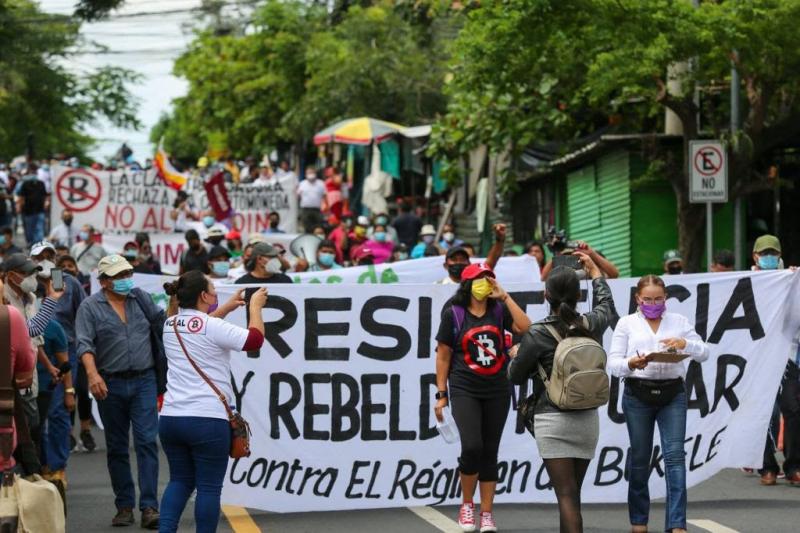Thank you CISPES for this article
September 1 protest in San Salvador led by the Resistance and Popular Rebellion Bloc against Bitcoin law. (Photo: Marlon Jimenez)
Youth, judges protest latest bids for power
Social movement organizations in El Salvador are on high alert following a Supreme Court ruling on Sept 3 that would enable President Bukele to seek a consecutive term in office, despite multiple and explicit prohibitions in the Constitution against consecutive presidential reelection, including Article 88 which requires “alternance” in the exercise of the presidency. Though the ruling does not come as a shock, as the president’s intentions to remain in office were already clear, it affirms fears that El Salvador’s postwar democracy has entered free fall and that Bukele is successfully clearing the road of any legal challenges to his consolidation of power.
The magistrates of the Constitutional Chamber of the Supreme Court who issued the resolution were unlawfully installed by legislators from Bukele’s New Ideas party after illegally ousting their predecessors on May 1. While many constitutional scholars, legal associations and popular movement organizations in El Salvador now consider the Court’s authority to be illegitimate, the president of the Supreme Electoral Tribunal, El Salvador’s electoral authority, said he would abide by the ruling, though the entire Tribunal has not yet taken a position.
The ruling stems from a February 2021 case which petitioned the previous court to bar Nancy de Martinez from running as a legislative candidate for the right-wing, Bukele-allied GANA party, based on statements she made to the media in favor of Bukele’s reelection. The plaintiff cited Article 75 of the Constitution, which prohibits activities that advocate for presidential reelection.
On September 3, the New Ideas-installed magistrates dismissed the case against de Martinez. But their ruling went much further, instructing the Supreme Electoral Tribunal to “apply this resolution...to allow, in accordance with article 152 [of the Constitution], a person who exercises the Presidency of the Republic and has not been president in the period immediately preceding to participate in the election on a second occasion.”
The resolution is a perplexing interpretation of Article 152, which states that “no person can be a candidate for the Presidency of the Republic [who] has served as President of the Republic for more than six months ... during the immediately preceding term, [nor] during the last six months prior to the start of the presidential term,” which has historically been interpreted as a ban on consecutive terms. But this new decision - if the electoral authority accepts it - means that Bukele’s illegitimate Supreme Court has unilaterally changed the highest law of the land.
The U.S. Embassy in El Salvador “condemned” the ruling on Twitter.
Notably, this is not the first time that the Supreme Court has usurped the role of the elected legislature to draft and enact legislation. From 2009-2018, a group of Constitutional Chamber magistrates elected by another right-wing legislative majority, at the time from the Nationalist Republican Alliance (ARENA), established a widespread practice of issuing rulings that, like the September 3 decision, exceeded the legal issues in question and served as a pretext to rewrite the law itself.
Manipulating the court is not the only way Bukele is seeking to maintain his grip on power. An ad-hoc commission to propose Constitutional reforms led by Vice-President Felix Ulloa could also put forward changes to limitations on presidential power. Though New Ideas’ has the two-thirds majority needed to pass a constitutional reform during this term, existing law requires that such reforms be approved by a supermajority in two consecutive legislative sessions, meaning that Bukele’s party would need to retain its near-total control in the next legislative elections in order to legally amend the constitution.
The ad hoc commission aims to lend a veneer of legality to Bukele’s campaign to subordinate El Salvador’s legal and judicial framework to the concentration and consolidation of presidential power. But social movement, legal and human rights organizations have already denounced the effort for lack of transparency and public participation, saying that both the top-down process and the current context preclude the possibility of democratic legitimacy.
The Supreme Court decision giving Bukele the green light to run in the next election comes in the wake of a reform passed by the New Ideas-controlled legislature just two days prior to purge all judges and public prosecutors over the age of sixty from the bench. The vote resulted in the immediate expulsion of over two hundred judges, including some that have recently made significant rulings unfavorable to the Bukele administration or presiding over historic cases, such as the El Mozote trial. The move was widely denounced as a violation of judicial independence and a continuation of New Ideas’ May 1 legislative coup against the Constitutional Chamber and the Attorney General, garnering protest and threats of a judicial boycott from judges.
Discontent and organized popular protest against the Bukele administration’s power grabs and political persecution continue to grow. On September 1, hundreds of Salvadorans took to the streets with the Popular Resistance and Rebellion Bloc to protest the highly unpopular Bitcoin law set to take effect on September 7. More youth rallied later that day to denounce the arbitrary detention of well-known cyber-activist Mario Gomez, a vocal opponent of the controversial Bitcoin law.
Another emergency rally led by popular movement and antifascist youth organizations is set to take place Sunday in San Salvador.
Statement from Alexis Stoumbelis, CISPES Executive Director
“If anyone still had doubts that Bukele is executing a systematic plan to gain complete and total control over the Salvadoran state, as many Salvadorans have been saying all along, this ruling by an illegitimately installed Supreme Court, which directly violates the Constitution to make Bukele the first president in modern history to be eligible to remain in office after five years, should make that abundantly clear.
Congress knows this and the U.S. State Department certainly knows this. So, people should be very concerned about the Biden-Harris administration’s continued support for the Salvadoran government, including the police and the military, which Bukele plans to double in size.
What’s happening in El Salvador today is almost a carbon copy of what the Hernández regime did in Honduras. The U.S. was on the wrong side of history then and unless the Biden-Harris administration takes action now to withdraw its support for the Salvadoran government, it will be here, too.”

